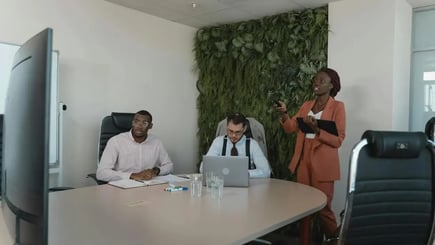Relevant Contents
Need Tailored Business Continuity Insights?
Contact Us Now for Personalized Guidance!
What kind of problems can it cause if your organization has the wrong people on its crisis management team?
Nothing too serious, most likely.
It could result in delayed or paralyzed decision-making, poor decision-making, and all the consequent impacts to the organization’s recovery and reputation if you ever experience some kind of emergency, but otherwise, you have nothing to worry about.
Well, clearly it is worth worrying about how your crisis management team is organized and who is on it. Because the impact of having the wrong departments represented, or having people on the team who cannot fill the unique demands of what is actually a very unusual and specialized role, can be significant.
With all that in mind, we thought it might be helpful this week to share our 8 Tips for Building a Good Crisis Management Team. Here they are:
- Embrace the role of educator. As a business continuity professional, you are not likely to have the authority to decide who will be on your organization’s crisis management team. However, you probably will have a platform to provide recommendations and educate your senior leadership on some of the special issues surrounding the composition of this team. Whether your organization is tinkering with the makeup of an existing team or creating one for the first time, you should embrace your role as an educator. Learn the issues and look for opportunities to share your insights with the decision-makers.
- Draw the team members from the correct departments.
Generally speaking, the team should include at least one person from each of the following areas:- Communications
- Impact/Damage Assessment
- Legal
- Risk Management
- Information Technology
- Finance/Accounting
- Human Resources
Representatives from other departments (e.g., Marketing, Vendor Management, or someone from a specific remote location) might also be worthwhile additions, depending on the circumstances.
- Choose as a leader someone who is a good fit for the role. Note that this is a very different thing from saying, choose as a leader the most senior person on the team, or choose the most senior person in the organization who would like to have the assignment. Sometimes a high-ranking member of the crisis team is best used focusing on their specific area of expertise rather than taking on the role of leading the whole team. What makes a person a good fit for the role of crisis management team leader (or member)? Read on to find out.
- Develop an understanding of what kind of people work best on crisis management teams. Crisis management calls for a unique temperament and skill set. These aren’t better qualities than those required to excel in other areas; they are merely different ones. Crisis situations are inherently stressful and time-pressured, and the people who are most effective in that type of situation tend to have the following characteristics:
- Are able to make quick determinations and decisions based on the information available at the time.
- Are confident but not egotistical.
- Have tactical knowledge, are good at solving problems.
- Are willing to act in the absence of consensus.
- Are calm, level-headed individuals who are not overly sensitive to criticism or debate.
- Are collaborative. Work well with people from other departments.
If a high-ranking person lacks these qualities, they are not a good fit for the CM team, no matter how much they would like to be on it.
- Learn how to identify the right kind of people. We often find that in large organizations some of the best crisis management people are the direct reports of the senior leadership team.
Another good way of identifying people who are good in this role is to keep an eye out for who comes to the forefront during business continuity exercises. Most people have a sense of who in their department is a level-headed, can-do person capable of working well with others. Ask around and identify these individuals.
- Master your brief in terms of what type of people are best for the CM role and why. You should know backward and forward the arguments as to why the CM team should be filled with individuals possessing certain skills and temperaments, rather than simply consisting of the people who rank highest on the org chart. You will probably need to make the case frequently as the team is coming together.
- Make your case in a meeting of the senior leadership.
The formation of the CM team is too important to trust that simply sending around an email will achieve the desired result. Someone connected with the BCM program will likely need to make a presentation to the senior leadership on the necessity of a CM team and how it should be organized and staffed.
- Compensate for political appointments by bringing in additional people who can do the work. Sometimes it happens that a high-ranking person must be included on the team for political reasons even if their knowledge or style is not the best fit for the role. If this happens, consider also bringing in a lower-ranking person from the same department who possesses the necessary knowledge and characteristics to do the job.
Need more guidance? Discover the 10 Characteristics of a Successful Crisis Management Team.
Unfortunately, experience suggests that the question of whether your organization will find itself dealing with a crisis is a matter of when not if.
This being the case, it is well worth the effort for you, your BCM program, and your organization generally to create a crisis management team which has the right people in the right roles.
Crisis situations are inherently stressful and unpredictable, but setting up a good CM team ahead of time can go a long way toward helping your organization sail through.

Richard Long
Richard Long is one of MHA’s practice team leaders for Technology and Disaster Recovery related engagements. He has been responsible for the successful execution of MHA business continuity and disaster recovery engagements in industries such as Energy & Utilities, Government Services, Healthcare, Insurance, Risk Management, Travel & Entertainment, Consumer Products, and Education. Prior to joining MHA, Richard held Senior IT Director positions at PetSmart (NASDAQ: PETM) and Avnet, Inc. (NYSE: AVT) and has been a senior leader across all disciplines of IT. He has successfully led international and domestic disaster recovery, technology assessment, crisis management and risk mitigation engagements.


